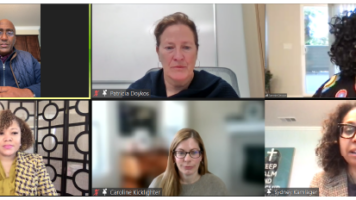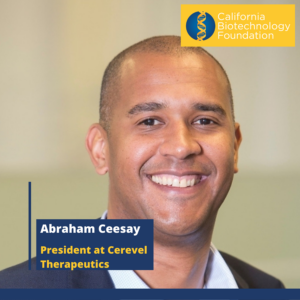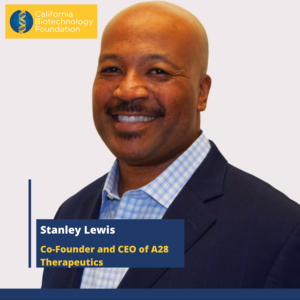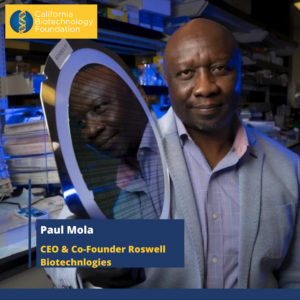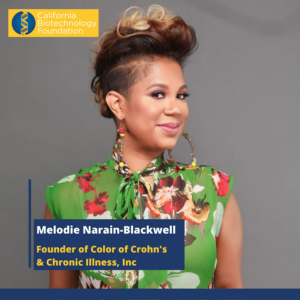Monthly Newsletter
CBF Celebrates Black Biotech Trailblazers During Black History Month
February 2020
CBF Celebrates Black Biotech Trailblazers During Black History Month
As Black History Month comes to a close, the California Biotechnology Foundation would like to provide a snapshot of remarkable Black trailblazers who are making important contributions to the life science industry.
Karen Akinsanya, Ph.D., Chief Biomedical Scientist at Schrödinger spent her career developing therapies for cancer and endocrine diseases and is now working on AI-driven drug discovery.
Abraham Ceesay, President at Cerevel Therapeutics has nearly two decades of experience in leading biopharmaceutical companies and commercializing innovative therapeutic products. He advocates to create space for people from diverse backgrounds who don’t always get opportunities to make significant impacts when given a chance.
Stanley Lewis, MD, MPH, Co-Founder and CEO of A28 Therapeutics. is a leader in HIV research and bravely took part in COVID-19 research from the start of the pandemic.
Paul Mola, President, CEO & Co-Founder of Roswell Biotechnologies, Inc is a leader in the genomics field establishing international genome sequencing programs and precision medicine partnerships.
Melodie Narain-Blackwell is a passionate health advocate, educator, mobilizer, and the founder of Color of Crohn’s & Chronic Illness, a nonprofit dedicated to health equity and BIPOC communities that are challenged with digestive diseases and chronic illnesses.
Learn more about Black trailblazers who have made important contributions to the life science industry and historic scientific discoveries.
Life Sciences Industry Scientific Contributions in Fight Against Cardiovascular Disease
As we commemorate American Heart Month, it’s important to reflect on the severity of cardiovascular disease (CVD) as well as innovative therapies by life science companies to treat CVD.
Twelve million Californians live with some form of cardiovascular disease, including congenital heart disease, coronary heart disease and high blood pressure. Heart disease is the number one killer in California, and the leading cause of mortality in the nation. Heart disease does not discriminate, killing men and women-young and old. It is estimated that CVD costs California nearly $52 billion each year.
When American Heart Month was officially designated in 1964, more than half the deaths in the United States were due to cardiovascular disease. However, due to better prevention, diagnosis and treatments developed in large part by biopharmaceutical researchers, death rates from CVD have dropped substantially in recent years, to 1 in 3 deaths annually.
California’s life science companies are relentlessly researching techniques to treat cardiovascular disease, correct genetic defects, moderate heart disease progression and even cure heart disease. Additionally, hundreds of other therapies have been discovered and mass produced that detect heart disease, lower cholesterol, treat hypertension, reduce obesity, manage diabetes, stabilize heart rhythms and lessen the damage of a heart attack. Visit the American Heart Association to view the top heart disease and stroke research advances in the past year.
Life science companies are also on the forefront of health policy to combat CVD. Recently, Novartis, in partnership with CQ/Roll Call, hosted a virtual event on February 23rd which brought together leading voices in health policy and the Federal and State level – including patient advocates, providers, think tanks, and current and former government leaders – for a robust discussion on the societal and economic burden of CVD and how public policies can help reverse the rising prevalence of CVD in the US. The thought leaders discussed the reasons behind the plateauing of decades-long downward trends in CVD, including rampant health disparities, and the potential for innovative population health approaches to address the social determinants of health that can drive poor outcomes. The experts agreed that policy changes – including broader screening and treatment guidelines and reimbursement models that prioritize value and access – are needed to better identify high-risk patients, get them necessary treatment and care, and ultimately reduce CVD morbidity and mortality.
For more information contact: Erin Guerrero – [email protected]
For more information, contact Patty Cooper with the California Biotechnology Foundation at 916-764-2434 or [email protected].

